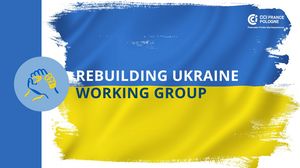
Rebuilding Ukraine – working group

Main objectives :
- unite member companies around the theme of rebuilding the Ukraine
- create a platform for knowledge & experience transfer ;
- discuss investments to date and future prospects, opportunities, difficulties, challenges ;
- benefit from the knowledge of experts.
The group is addressed to representatives of various industrial sectors, such as construction, infrastructure, energy sector, as well as consultancies and other companies interested in implementing projects or investments in Ukraine.
Upcoming meetings:
Brak wydarzeń z wybranej kategorii
Participate in the Committee:
























Previous group meetings:
On 26 February, a meeting of the CCIFP's Rebuilding Ukraine working group took place on cooperation between foreign (Polish and French) and Ukrainian business.
The special guest and key expert at the event was Maksym Maksymenko, Partner, Head of Real Estate & Infrastructure, Co-Head of Energy at AVELLUM law firm based in Kiev. Together with Slawomir Uss, Attorney-at-law and Partner at Sołtysiński Kawecki & Szlęzak law firm they explained how Polish and French companies can start their investment in Ukraine (i.a. LLC, RepOffice, JSC and JVs).
Mr Maksym Maksymenko presented main options to get involved in reconstruction, namely public-private partnerships (PPPs), privatization, industrial parks and projects with significant investments and explained how to pick an optimal project framework. We raised also the issue of participation in public procurement, highliting key considerations for foreign companies bidding on reconstruction projects.
The CCIFP Rebuilding Ukraine Working Group met on 7 November to discuss how KUKE S.A. (Export Credit Insurance Corporation) is currently supporting the reconstruction of Ukraine. Our special guest was Łukasz Kowalski, Director of the Strategic Clients Office of KUKE S.A., who presented the new instruments available after the amendment of the law in September this year.
Poland is the first country in Europe whose export and foreign investment insurance regulations have taken into account the war in Ukraine, making it possible to comprehensively support the expansion of Polish business in the country and, at the same time, actively participate in its reconstruction and modernisation.
On 28 September, the Act on Insurance Guaranteed by the State Treasury, amended by the Parliament, came into force, which allows the Export Credit Insurance Corporation to once again provide protection for Polish companies' investments in Ukraine, despite the still ongoing war there. The legislator decided that, although the risk is very high, it is in the interest of the state to provide entrepreneurs with insurance for their investment outlays and to guarantee the repayment of 100 per cent of the value of investment loans in order to also convince banks to finance their clients interested in being active in our neighbour. Thus, KUKE S.A. is fully prepared to support Polish business on the Ukrainian market.
The KUKE's activity on the Ukrainian market is based on three pillars.
- The first pillar is to support the current activities of Polish companies.
- The second pillar is to insure investments of Polish companies in Ukraine against political risk (including warfare) and to guarantee Polish banks the repayment of financing granted for investments, e.g. in the formula of project finance or for financing acquisitions.
- The third pillar is directly related to the reconstruction and modernisation of Ukraine. Assistance from the Export Credit Insurance Corporation consists primarily in the fact that for individual projects such as the restoration of destroyed energy or road infrastructure, the construction of new public facilities, investments by companies from other countries, we find financing and guarantee financial institutions its repayment, in exchange for the inclusion of Polish companies in these projects.
The CCIFP's Rebuilding Ukraine working group opened its series of post-summer meetings with a presentation on legislative changes to stimulate business development in Ukraine and protection of investors' rights. The meeting, which took place on 11 October, was chaired by Andrzej Mikosz, Partner at Taylor Wessing in Warsaw.
The introduction to the meeting concerned the general situation in Ukraine in the context of the ongoing hostilities and current demographic and economic data.
We raised the subject of special legislation brought in by war with regard to State Registers and war time FX and capital flow regulations. We also discussed the implementation of acquis communautaire : Ukraine has gradually approximated to substantial elements of the EU acquis across many chapters.
The subject of our discussion was also the judiciary: the reform of the entire judiciary branch is one of the key elements in the process of integration with the EU. We also focused on peculiarities of the Ukrainian system, by comparing public and private bailiffs. The process to reform the Ukrainian system of enforcement of judicial decisions is still not finalized while the issue of enforcement of judicial and administrative decisions is being considered by the EU one of the most challenging and demanding issues in the entire process of harmonization of Ukrainian law with EU requirements.
We raised the issue of Bilateral Investment Treaties freedom of flow of capital. Ukraine has 76 Bilateral Investment Treaties in force, with other countries and with OPEC. The EU proposed regulation and instruments regarding financing of the reconstruction of Ukraine do not contain specific provisions regarding dispute resolution; including issues of investment disputes. That provides for the BIT protection and Washington Convention to be the basis of legal protection of investment also in an activity connected with use of the EU funds under the EU Ukrainian reconstruction facility. The risks in the context of the decision to invest in Ukraine is the limited access to commercially and legally material information. It is possible to access via internet to: Register of Legal Entities and Real Estate Register containing records on proprietary rights and encumbrances of the Real Property in Ukraine. The both are administered by the Ministry of Justice. As at today, despite fierce public criticism, the registers have not been made publicly available. The low level of completeness of the Register of Rights on Real Property may become a major risk issue in the future reconstruction of Ukraine with special emphasis to the Eastern part of the Country.
The full summary is available HERE
On 13 June, a meeting of members of the CCIFP's Rebuilding Ukraine working group took place, which provided an opportunity to discuss the current situation on the labour market in Ukraine.
Monika Kocińska, General Director CEE at international headhunters Copers International Search, and Polina Aydin, HR Director at TSUM department store in Kiev, talked about the changes brought about by the war, as well as the prospects for the future.
During the meeting, we discussed how the Ukrainian labour market has changed since the beginning of the war. We looked at the economic and demographic data that is the result of the mass migration triggered first by the annexation of Crimea and then by Russia's invasion. An analysis of the profile of the Ukrainian refugee population shows that nearly 20% of this group are private entrepreneurs, followed by skilled workers with non-technical and technical profiles. In terms of the potentially economically active population, of the 17.4 million Ukrainians active in 2021, there are currently 2.5 million unemployed, 2.5 million employed in public administration and only 7 million citizens employed in business.
From day one of the Russian invasion, companies adapted their structures to the current economic and social conditions. The human resources activities of companies were strongly influenced by the geographic location of the company, the level of damage sustained, the financial situation before the war and where the employees currently reside. In March 2022, new provisions in the Labour Code were adopted, applicable for the state of war. The main changes include restructuring measures, salary reductions with immediate effect, suspension of the employment relationship and a provision that official communication with employees can take place through all possible communication channels, including instant messaging.
Regarding the dynamics of salary changes, in 2023 most employers will increase or will increase the salaries of their employees. Due to the huge wave of migration, there is a very high shortage of skilled professionals. Associated with this is a high increase in their salaries. At the same time, salary expectations for all employees have increased. The official minimum wage in 2023 is USD 180. To retain employees, employers offer personal development support, training programmes, cross-skilling / up-skilling / re-skilling, internal promotions, financial support, psychological support, flexible working hours as well as remote working or extra sleeping hours.
Among the goals of the new economic policy developed by experts from the Ukrainian Institute of the Future is to reach a population of 45 million citizens by 2035 (currently 42.975 million). In order to achieve it, an effective migration policy will be necessary, consisting of a simplified labour code for migrants, the possibility of granting citizenship to investors or improving the education system. International investment to bring in specialists from abroad will play a key role in this process, as well as a family policy to encourage people to start or expand a family.
Research by the Ukrainian Centre for Economic Strategy shows that 51% of refugees would only choose to return to Ukraine on the condition of a complete end to the war, for 34% a cessation of armed fighting and missile attacks would be crucial, 28% of refugees would consider returning to their homeland on the condition of a well-paid job.
We would like to thank the experts for a handful of up-to-date data on employment in Ukraine and for sharing their valuable experience from both working in the Ukrainian market and working closely with those who operate there despite the devastating impact of the Russian invasion.
Members of the CCIFP's Rebuilding Ukraine working group met on 16 May to address the position of the TSL sector in the face of the ongoing war.
During the meeting, we discussed the role that the Polish transport industry will play in rebuilding Ukraine, touching on the challenges, risks and future prospects. Our experts were specialists representing the voice of the industry: Michał Słomski, Director of Sales Eastern Europe at Bolloré Logistics, and Piotr Mroczka, Transport Director and Paweł Modzelewski, Transport Operations Manager at ID Logistics.
Due to the ongoing war across the eastern border, Poland has become a major logistics hub for Ukraine. It now provides the infrastructure for the transport, transhipment, short-term storage, sorting, consolidation and shipment of goods related to military and humanitarian aid. However, over time, the nature and destination of cargo will be linked with the post-war reconstruction of Ukraine.
During the meeting, we discussed the following aspects:
1. Characteristics of the Polish TSL sector
Transport services account for 37.1 per cent of services provided by Polish companies to German entities (70 per cent of transport services are road transport). At the end of 2021, the number of people employed in the TSL industry in Poland was 951,000. In the same year, the TSL industry generated 5.7 per cent of the Polish GDP. During this period, Polish drivers transported the most goods (over 19%) in the intra-EU market. The structure of employment in the transport sector in Poland is very fragmented compared to other EU countries - as much as 32% of workers in the sector are employed in micro-enterprises.
2. TSL sector affected by war
The priority of transshipment of raw materials such as coal and grain, the disruption of supply chains and the energy crisis have meant that the logistics industry has had to significantly reduce its costs. The war in Ukraine for the TSL sector is a painful experience comparable to a coronavirus pandemic. In February 2022, restrictions on trade with Russia and Belarus were introduced, and drivers from Ukraine very often gave up their jobs. For this reason, hauliers who had previously served eastern destinations were, as it were, forced to seek orders on the domestic market and in the West. With the downturn and the associated drop in demand for transport services across Europe, which are also a consequence of the war and the ensuing energy crisis, there is not enough work for all carriers. At the same time, 10,171 driver licences were issued in 2022 - more than twice as many as in 2021 and a historic record, this has to do with the fact that entrepreneurs from Ukraine and Belarus have decided to start operating in Poland. At the end of 2022, there were 44 499 licences in Poland, 17.5% more than in 2022. more than the year before.
3. Current situation
Polish haulage companies continue to block one of the Polish-Ukrainian border crossings in protest against what they see as an unfair market advantage for Ukrainian companies. They are demanding the reinstatement of the mutual entry permit scheme, which was suspended after the outbreak of war in Ukraine. Polish hauliers claim that following European and Ukrainian regulations that came into force last summer, freight rates fell after Ukrainian companies were granted almost unlimited access to the Polish market. They claim they cannot compete on equal terms with Ukrainian hauliers, who are not bound by European regulations and have lower wages. A key demand of the Polish hauliers is the reinstatement of the permit system for Ukrainian hauliers, which would limit the number of transports they can carry out in a year. In their opinion, the return to the old rules will enable Polish companies to return to the market.
4. The attitude of the TSL industry towards Ukraine
The negative attitude of the TSL industry towards Ukraine as a potential market and area of activity is a challenge for the Polish authorities. The Ukrainian market is a huge development opportunity that may be missed due to the last 30 years of bad experiences of Polish companies (corruption, lack of security and legal certainty). Serving attractive and reliable Western markets makes Polish companies afraid to risk their operations in the East. However, cooperation between Polish and Ukrainian entities will be crucial in the context of building relations between the countries and rebuilding the Ukrainian economy.
5. Poland as a logistics and transhipment hub for Ukraine
The solutions put in place to provide humanitarian support to Ukraine will also be important in the context of rebuilding the country. Currently, the transit of goods can take place through Poland, Slovakia, Hungary, Romania, Moldova. Poland's advantage is the possibility to use 8 border crossings for road transport and 6 for rail transport. We discussed the challenges and opportunities that are associated with customs clearance, warehousing and all available modes of transport (road, rail, ocean, sea and air).
The CCIFP's Rebuilding Ukraine working group continues its activities in the form of monthly meetings. The last one took place on 18 April and was dedicated to public procurement.
The following issues were on the agenda of the meeting:
- Participation in public procurement in Ukraine from the perspective of Polish companies.
- Key features of the public procurement process in Ukraine with particular focus on construction tenders.
- Main requirements for starting a business in Ukraine in the context of participation in construction tenders.
- Joint-ventures with Ukrainian partners to participate in tender proceedings in Ukraine.
The meeting was chaired by Maksym Sysoiev, partner at Dentons in Kiev. He was accompanied by Agnieszka Gilowska from the Public Procurement and Government Contracts Law Team of Dentons' Warsaw office.
The full summary is available HERE
On 15 March, the first meeting of the working group on plans for the reconstruction of Ukraine took place. It was attended by representatives of 30 member companies from various industrial sectors, such as construction, infrastructure, energy sector, as well as consultancies and other companies interested in implementing projects or investments in Ukraine.
During the debate, which took the form of a tour de table, each participant had the opportunity to present their company's experience to date on the Ukrainian market, as well as ideas for the group's future activities. The working group initiated at the meeting is intended to be a platform for knowledge & experiences transfer.
We invite all interested companies to participate in the events. Thank you for your involvement.
The full summary available here
Wszystkie stanowiska i sprawozdania z przeszłych komitetów CCIFP:





